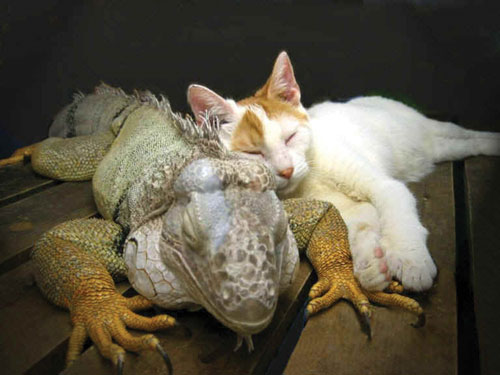 An iguana and kitten get kleptothermic.
An iguana and kitten get kleptothermic.
Happy (almost) New Year! We’re closing out 2014 with our latest favorite buzzworthy words. This week: appropriating culture; the darkness of anonymity; and one way to get toasty this winter.
Columbusing
“Columbusing is a word that can be used to describe the reappropriation or perhaps misappropriation of African-American culture — for instance, various slang terms that get appropriated by a white mainstream audience.”
“Die-In, Vortex, Selfie Stick: What’s The Word Of 2014?” NPR, December 28, 2014
“You guys, I discovered an incredible new dish: it’s called ramen!”
Such is an example of Columbusing, the “discovery” of “something that’s existed forever,” says NPR, the way that Christopher Columbus “discovered” America although it existed long before he set foot on its shores.
While the term mainly applies to the “discovery” of something outside one’s own culture, nationality, race, or neighborhood, we’d argue Columbusing could be applied to the “discovery” of anything not new (eg, “Have you guys heard of this show called The Walking Dead?”).
cousin planet
“Mars is our brother planet and Venus is our sister planet, but what the heck is a cousin planet? Hint: we don’t have one, because our Sun is an only child.”
Becky Ferreira, “Astronomers Found Jupiter-Sized ‘Cousin’ Planets for the First Time,” Motherboard, October 1, 2014
Cousin planets are, according to WIRED, “a pair of planets each orbiting a different twin star.” For example, WASP-94A and WASP94B are twin stars, or a binary-star system, around which two Jupiter-sized extrasolar cousin planets orbit.
The Earth doesn’t have a a true cousin planet (an Earth “cousin” that was discovered earlier this year is referred to as such because of its similarity to Earth) since the Sun is an “only child,” as Motherboard says, and doesn’t have a twin.
dark money
“Advocates of undisclosed ‘dark money’ spending, concerned that they are losing ground, are falsely representing themselves as the voice of mainstream business, hoping to sway companies away from their better instincts.”
Bruce F. Freed and Charles E.M. Kolb, “U.S. companies shine sunlight on ‘dark money,’” The Washington Post, December 29, 2014
According to The Washington Post, dark money refers to “anonymous political donations from individuals or companies.”
Such a practice can be harmful in a number of ways. It could damage a company’s reputation “if a political payment is exposed as conflicting with its stated values or business objectives”; if donations are secret, “a politician can quietly shake down a company”; and when a company “‘outsources’ its politics through payments to a third-party advocacy organization, it can lose control over the funding.”
dark web
“It’s referred to as the ‘Wild West’ of the Internet: Underground websites—often called the ‘dark web’—that sell illegal drugs, guns and stolen credit cards.”
Josh Lipton, “’Dark Web’ Market for Illegal Guns and Drugs Grows,” NBC News, December 18, 2014
The dark web, according to BBC, refers to “anonymous, virtually untraceable global networks used by political activists and criminals alike.” It seems to part of the Deep Web, a general term for “the portion of World Wide Web content that is not indexed by standard search engines.”
While some deem much of the content of the Deep Web to be “innocuous,” a recent study found that over 80 percent of visits to the dark web relate to pedophilia.
Dark web and Deep Web seem to differ from yet another term, Dark Internet, which “refers to any or all network hosts on the Internet that no-one can reach.”
kleptothermy
“There’s a specific term for this warmth-sucking behavior – kleptothermy.”
Brian Switek, “Science Word of the Day: Kleptothermy,” National Geographic, December 29, 2014
Sure, that iguana and kitty snuggling together is darned cute, but the ectothermic iguana might have an ulterior motive: stealing the kitty’s heat.
Kleptothermy is when an animal cuddles up to another animal to take its warmth. For instance, says National Geographic, a cold-blooded snake may curl up in a seabird burrow, and as a result raise its temperature from a chilly 89 degrees to a toasty 99.
The word kleptothermy comes from the Greek word kleptein, “to steal,” and the Greek thermos, “hot, warm.”
(H/t Matt Baldwin.)
[Photo via National Geographic]